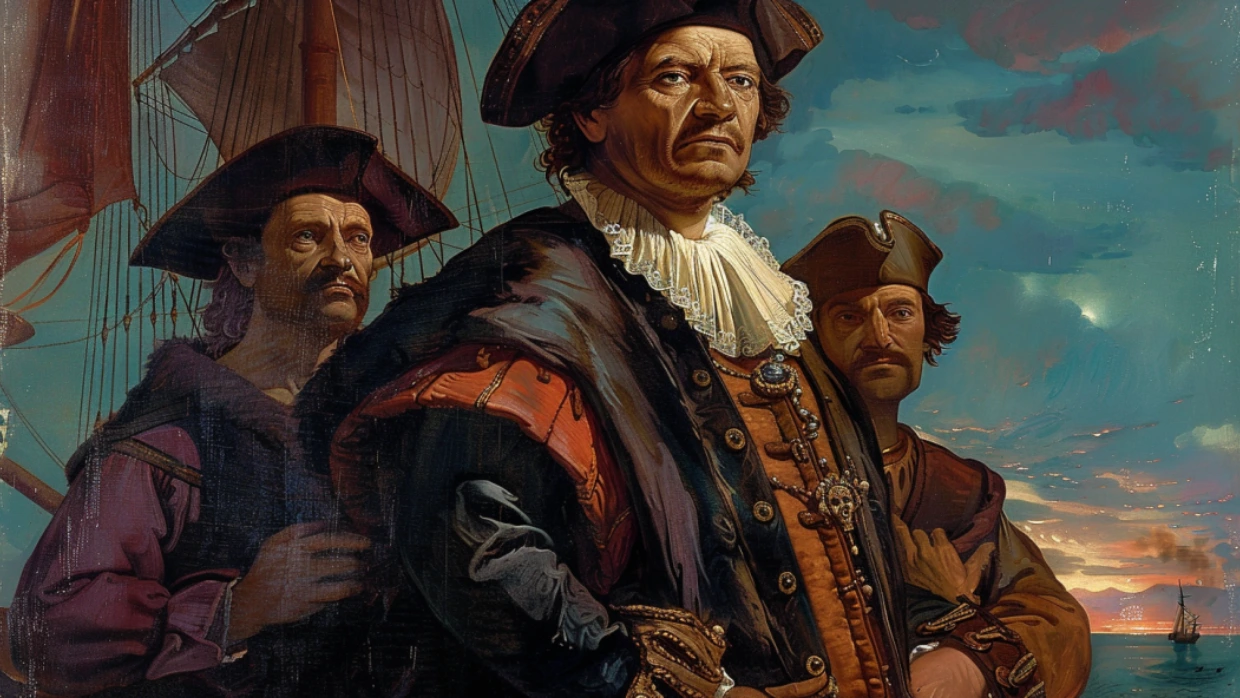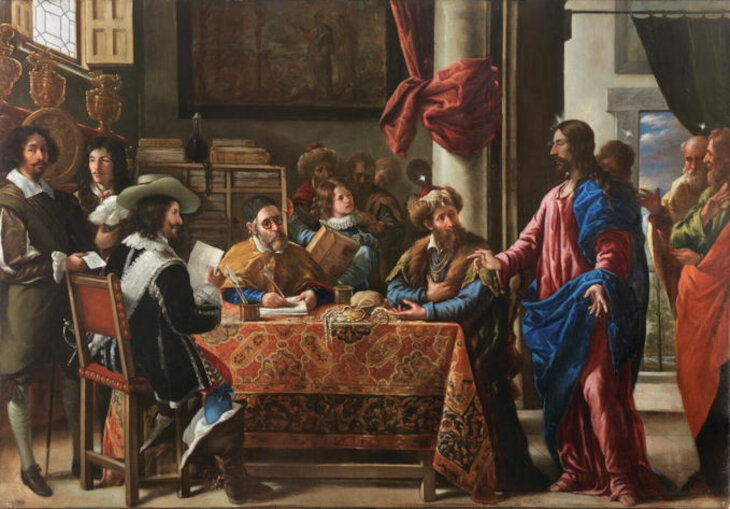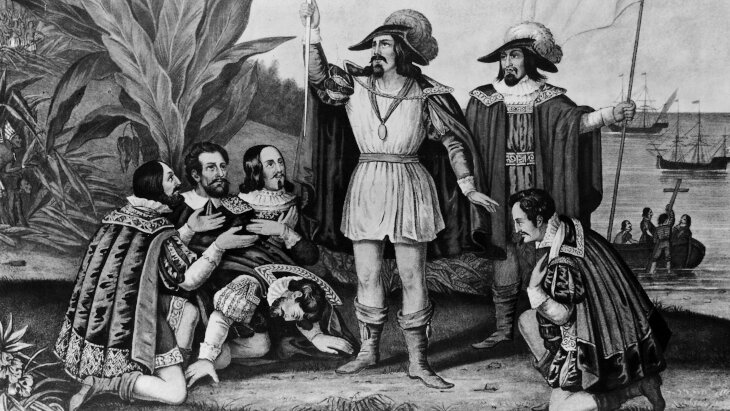 Raise a Glass to Freedom
Raise a Glass to Freedom


9 min read
Fleeing the Spanish Inquisition, some Jews took their chances and set sail into the unknown with Columbus.
Columbus Day is popularly celebrated in the United States and elsewhere as the moment when Christopher Columbus made landfall on the island of Guanahani in what is now the Bahamas on October 12th, 1492, thus discovering the Western Hemisphere otherwise known as the New World. This event led to an age of discovery where European explorers mapped out the Americas and began a massive project of conquest, colonisation, settlement, and nation building in the New World.
While the milestone discovery is considered a major landmark in the history of human civilization, what many people don’t realize is that several members of Columbus’ crew were actually Jewish.
For about a century prior to the discovery of the Americas, Jews in Spain, which was the largest Jewish community in the world at the time, faced harsh persecution, antisemitic violence, and forced conversion. While many Jews preferred death over apostacy, approximately 200,000 Jews, about half of Spain’s Jewish community at the time, converted to Christianity out of fear and under compulsion of death.1 Some feigned conversion only to practice Judaism in secret. Many conversos, as they were called, achieved high positions within the Spanish state. Famous physicians within the royal court like Francisco Lopez, poets and writers like Juan de Mena, and bankers like Gabriel Sanchez, were all conversos whose new religion enabled new opportunities for them.
However, starting in 1478, the Inquisition was established in Spain and targeted conversos who were insincere to their new faith by maintaining certain Jewish traditions in private. It was not only uncomfortable to be Jewish in Spain, but even as a converso, life on the Iberian Peninsula was no longer safe.

On January 12, 1492, Christopher Columbus, an Italian merchant, navigator, and explorer, met with King Ferdinand and Queen Isabella of Spain to seek funding for a proposed voyage westwards across the Atlantic for the purpose of discovering a new sea route to India. Luxury goods and spices from the east were in high demand in 15th century Europe, but ongoing warfare with the Ottoman Empire and Muslim warships in the Mediterranean blocked off European trade routes to India via the Middle East. Although it was understood that the world was round by this time, transatlantic voyages were considered unfeasible due to the Gulf Stream, which would mean travelling against strong eastward winds over unknown periods of time and contending with severe storms and hurricanes at sea.
Due to the dangers and likelihood of financial loss, Queen Isabella was not convinced and turned down his request. This was not the first time Columbus failed in fundraising. He made an earlier attempt to convince the Spanish monarchy to support his mission back in 1486 and also tried to get funding from Portugal before that in 1484. Nobody seemed to think that Columbus could pull it off.
Leaving the meeting feeling dejected, Columbus gave up on the Iberian Peninsula and thought to perhaps seek support from other European powers further to the north, like France or England. Further rejections by other countries may have convinced Columbus to give up on his dream and thus the New World would not have been discovered until sometime later in history by someone else.
A converso of Jewish origin by the name of Luis de Santangel intervened to change the course of history.
Columbus was already on his way to France when a converso of Jewish origin by the name of Luis de Santangel intervened to change the course of history. As the royal treasurer, Santangel had a considerable degree of influence and built a personal relationship with both the king and queen. He advised Queen Isabella that Spain would lose out on a major opportunity for fame and glory if Columbus were to be successful in his mission through the backing of another country. He even offered to contribute towards the project through his own personal financing.
With that, Isabella relented and sent a messenger to retrieve Columbus and summon him back to the royal court. Columbus was finally given royal approval to initiate his transatlantic voyage with the backing of the Spanish Crown.
What was Santangel’s motivation in helping Columbus to the effect that he was willing to contribute large sums of money from his own pocket?
For nearly 800 years, Jews lived under Muslim rule in Spain, which was largely a long period of tolerance, religious freedom, and prosperity known as “The Golden Age”. Christian European forces never fully capitulated to Muslim rule and conducted a military campaign known as the “Reconquista” that slowly recaptured bits and pieces of Spanish territory over the centuries. By the 15th century, the vast majority of Spain was now under Christian control. The last bastion of Muslim rule was over the city of Granada, but after a siege and a series of battles in 1491, the city finally surrendered on January 2, 1492, just ten days prior to the meeting between Columbus and the Spanish monarchs. Word on the street, or in the palace, was focused on religious unity. Now that the struggle against the Muslims was over, the focus would soon shift to “the Jewish problem”.
Perhaps Santangel’s motivation in sending out Columbus was to find a new haven for the Jews of Spain, which would soon be urgently needed.
Santangel might have outwardly looked Christian, but in his heart he was still Jewish. Rumors circulated of a coming decree to force the remaining Jewish population to choose between conversion or expulsion. Perhaps Santangel’s motivation in sending out Columbus was to find a new haven for the Jews of Spain, which would soon be urgently needed.
Indeed, on March 31st, 1492, the Alhambra Decree was signed that would effectively bring the practice of Judaism to a swift end in the Spanish kingdom. The Jews were given only four months to choose between a Christian life in Spain or a Jewish life in exile. At the same time that the Jewish population was trying to sell their properties, collect their debts, and search for migration routes, Columbus was recruiting sailors and crewmen for his upcoming voyage. It’s no surprise that some Jews or conversos perceived such a voyage as a means to get out of Spain.
Among the 90 crewmen of Spaniards and Moors were also a few people of Jewish origin. They included two experienced sailors, Roderigo de Triana and Alfonso de la Calle, a physician, Maestre Bernal, a surgeon by the name of Marco, and Queen Isabella’s personal inspector, Roderigo Sanchez de Segovia. Probably the most high-profile Jew on board who had recently converted to Christianity by force was Luis de Torres, an interpreter for the governor of Murcia. As a result of his knowledge of Hebrew, Arabic, Aramaic, and other ancient languages, Columbus thought his linguistic skills would be useful in communicating with the locals.

According to some accounts, Columbus was originally supposed to set sail from Spain on July 31, but because of the large number of Jews struggling to exit the country on the last day before the decree went into the effect, the harbor at Palos de la Frontera was overcrowded and the famous sea voyage was delayed for a few days. Some Jews were paying Muslim sailors to take them to the shores of North Africa, others were getting picked up by Ottoman ships to facilitate their immigration to Turkey, and yet some had a different direction in mind…the West. Finally, on August 3rd, 1492, Columbus led his crew on a convoy consisting of the Santa Maria, the Nina, and the Pinta to pursue their historic mission.
A Jewish sailor became the world’s first European explorer to see the Americas.
After more than two months on the open sea with no land in sight, the crew started getting rowdy. On October 11, Columbus begged his crew members to remain vigilant for any sight of land both day and night and even offered higher wages as an incentive. That night at around 2:00 AM while the rest of the crew were either sleeping or drinking, Roderigo de Triana, one of the Jewish sailors, spotted a faint light in the distance, a fire2. That could only mean one thing: “Tierra, tierra! Land, land!” Thus, it was a Jewish sailor who became the world’s first European explorer to see the Americas. Landing in the Bahamas, Columbus was sure that he had reached India. He therefore called the native population Indians.
Columbus and his crew would continue exploring this new world arriving in Cuba by the end of the month in what Columbus thought might be China. From the shores of northern Cuba, Columbus deployed his Jewish interpreter Luis de Torres to move inland and make contact with what he thought was the Emperor of China. He ended up reaching a village of 1000 inhabitants who never encountered a European before and treated him as a Divine being3. (This wouldn’t be the first time a Jew was worshipped as a god.) It was in this village that Torres was introduced to the concept of smoking tobacco, which he later shared with his Spanish compatriots upon their return to Europe. The next island to be discovered became known as Hispaniola (modern day Haiti and Dominican Republic). 39 crewmen including Luis de Torres settled there and thus the first colony in the New World known as La Navidad included at least one Jew.
Until 1492, for most of the Middle Ages, Spain was the global center of Jewish life, but as soon as that reality changed, seeds were planted for a new future home or safe haven. The Americas would be seen as a Jewish refuge from the Inquisition and later a refuge from other forms of persecution such as the pogroms and the Holocaust. From the very early foundations of European exploration, Jews participated and even led the way for nation building in the Americas. As we remember Christopher Columbus, let’s also remember the Jews who made his celebrated voyage possible.

Discovered? There were people living here. Considering what's going on in Israel (and the fact people are trying to say Jews aren't indigenous) this is pretty egregious reporting. Also, Columbus looked the other way while his people tortured and raped people, including children. It's also well documented (in his journals) he didn't have a problem with this because he viewed these people as less than human. So, Jews escaping persecution sat back while others were persecuted? How is this a positive position? This is by far the worst article I've read on this site. Columbus being at best a weak, complacent leader and at worst a sadistic torturer of innocent people is not exactly a new discovery. We talked about it in high school in the 90's.
Wonderfully informative! Thanks so much for sharing! Steve Finer
Most informative and very much appreciated!
ok NOW, People from everywhere, let’s unite for the good of Humanity!
The synagogue in Freeport Bahamas is named after Luis de Torres.
Columbus today is not celebrated; the cultural revolution wants the populace to despise him. AISH needs to get caught up. The last thing Jews need is an association with the hated Columbus.
According to all historians the Barcelona log the copy made by Queen Isabella given to Columbus and passed down to his son Diego does not contain Jesus anywhere. The original log is lost and was never recovered. Nowhere in the log does Columbus claim to be Christian.
Thank you for your informative and enlightening article!
In the past, I read that Columbus himself was Jewish; is that theory still valid?
And there’s definite proof that Scandinavian sailors were in northern North America around the year 1000 CE. Not only are there written accounts, the remains of a Scandinavian settlement was discovered in Canada about 60 years ago.
In College I wrote my thesis on American Music history but during that time I documented Columbus and the jewish sailing to the new world. I found so many interesting ideas and concepts which shaped how the movement of music that came to the new world was significant. I researched actually who traveled with Columbus and what attributes they gave to others on the ships but also cooking, singing, music, religious studies and more. They helped the Indians in Hispaniola and more. Then they traveled to other small islands and then to the USA.
There is no evidence to suggest that Columbus was Jewish. Even a cursory reading of the ship's log shows Columbus praising Jesus and asking for help from Jesus. He carried a Christian flag.He was praised for bringing Christianity to the new world. Many South American countries honor him for that reason, not because he discovered anything.Since Jesus was a Jew , from Jewish parents and all the apostles were Jews , we can say he brought the bible and the judaic moral code but beyond that , its fantasy.
CC's writings are suspiciously Jewish 😉
I have Aztec and Hebrew DNA dating back 500 years... any guesses on how that happened??
Another interesting read, Jewish Pirates of the Caribbean by Edward Kritzer
Tha't a great book.
"This wouldn’t be the first time a Jew was worshipped as a god" made me laugh like mad. Thank you
Always mocking us. Keep it.
Gateway to the Moon by Mary Morris is historical fiction about this era and more. Fast, good read
Great and very enlightening article as my ancestors are from Spain.
It is remiss to not mention Abraham Zacuto, a rabbi who invented the Astrolabe, and had a great part in Columbus’ voyage.
The true history surrounding Columbus is actually quite horrific. That he may have had Jewish blood or that some of his crew were Jews raises serious questions about Jewish beliefs and ethics. If there were Jews on the ship, I'd like to know if there are any writings regarding how they perceived and acted during the significant atrocities he led. More so, were any Jews involved in sending Columbus back to Spain in chains in August 1500 for his brutal and tyrannical reign? The vast majority of history we have been taught surrounding Columbus and his voyage is inaccurate.
Wild, malicious speculation about atrocities being committed by Jews, in the name of the Jews, who were acting under the Jewisĥ code of ethics. The code morphed into the Judeo-Christian tradition.
No, the question was, how did any of these Jewish members cope with what was occurring, as the crimes Columbus committed were entirely inconsistent with our code of ethics?
You're engaging in fallacy of applying modern standards to medieval conduct. By the standards of the time, Columbus didn't commit any crimes. It was a routine and common conduct among pretty much everyone, both from Europe and from elsewhere. As for Jews being part of the crew, we don't really know if this tidbit is real and in all likelihood they were not practicing Jews who'd be ruminating on how their actions align with Torah values.
That is absolutely not true. Columbus' actions were considered to be barbaric even at the time. He was prosecuted for many of them. Plus, I don't remember child rape being acceptable in any section of the Bible or Torah. Also, forced conversion was what the Jews were supposed to be escaping . . . I thought hypocrisy was also a sin. Perhaps ask yourself why you feel the need to justify these people, because there was no time in history that what Columbus did was considered legal or moral. Did people do it? Yes. Did they know it was wrong? Yes. Justifying their sins doesn't absolve you of yours.
I have a book, written by Simon Weisenthal, Sails of Hope. It describes this differently. I met Jews from Pansms who said they attended a synogogue there that was the first in theamericas . The Nina eas sunk purposefullyin Panama and the crew esrablished a Jewish colony in Panama. Christopher Colunmbus , whose mother was a Jew from Genoa, and therefore a Jew, sailed back to Soain and told Isabella that one ship foundered. He never revealed his Jewish heritage, but was responsible for saving the Jewsthat sailed with him. I thought the book was fictional until I met the couple from Panama. I was also in thr Bahsmas on the island called Christopher Columbus about 5 years ago, at aparkon Febuary 6, which had a stone conmemorating the landfall the Christopher Columbus on that very day in 14….
To continue, themat very day , in 1492. So which version is correct?
Conversos established from New Mexico to Peru. Recently Spain decided to give back the nationality to those who could prove the Sephardic Jewish origin. There are circa 120,000 people who applied and among them, descendants of conversos. Just from Mexico are approximately 22,000. Communities of Cristo Jews continued practicing Jewish traditions until the inquisition was established in Mexico and Peru. Descendants of conversos had to prove the line of genealogy with vital documents until the person who was persecuted by the inquisition.
In Mexico there were communities in Taxco, Los Altos (Jalisco), Guanajuato, and Monterrey. Also settled in what is now Rio Grande Valley, Tx and New Mexico. I know there were also communities in Costa Rica.
Crypto Jews
It was autocorrected to “cristo” jews